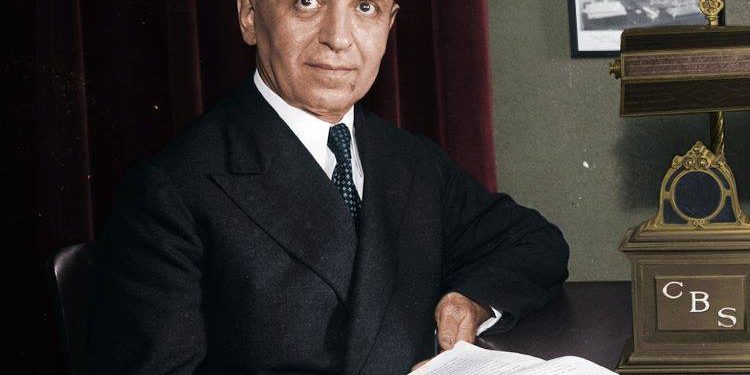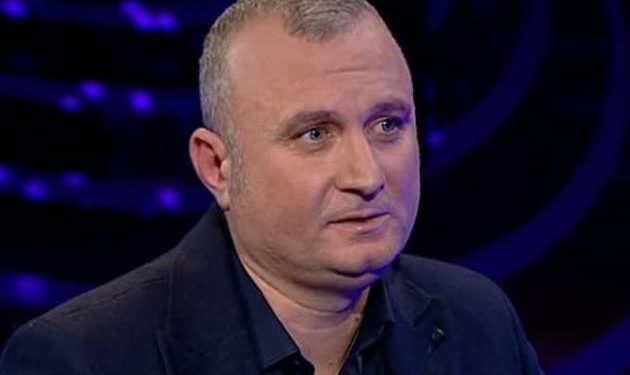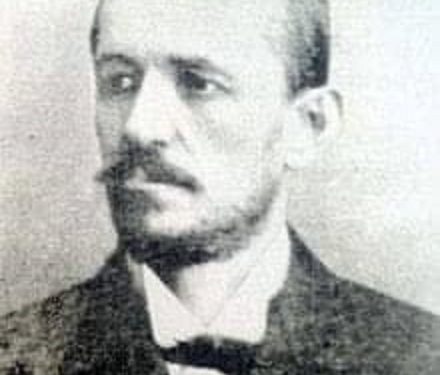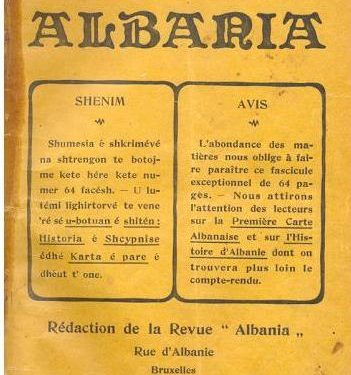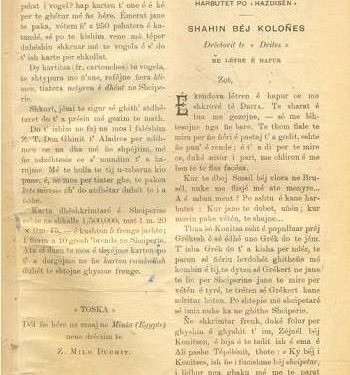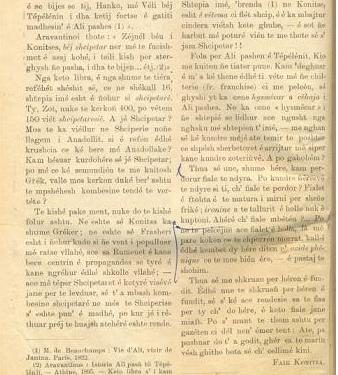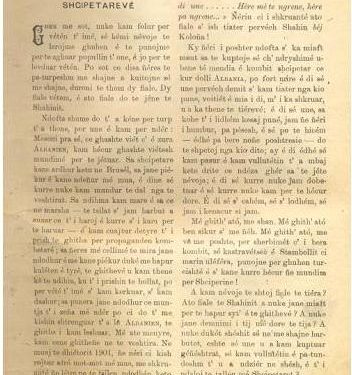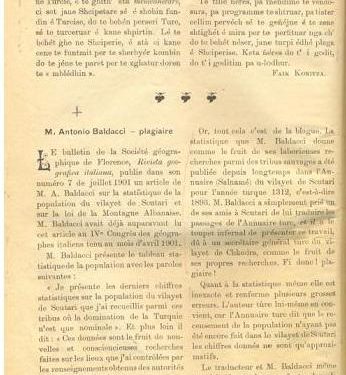Memorie.al / Faik Konica, the greatest Albanian polemicist of his time, has often been criticized for this “vice” by his contemporaries and later. Even to this day, one still comes across interesting materials, which can sometimes be discovered quite easily, just by glancing at the collection of his famous newspaper or magazine, ALBANIA, which was published in the late 1800s and continued (with interruptions) into the early 1900s. In some of its issues, one frequently encounters not only intellectual and fruitful polemics that served the national cause or the development of political-socio-literary thought across Albanian territories, which Konica masterfully utilized, but also ironic and even quite trivial and worthless responses to the claims and accusations made against him by other patriots and nationalists of the time.
Such is the case with Shahin Kolonja, whose contributions were widely recognized and valued then (as they are now). Konica, in his role as the director and publisher of ALBANIA, and his counterpart, in his role as the publisher and editor-in-chief of the newspaper “DRITA” (The Light), which was among the first newspapers in Albanian colonies abroad, but also Albanian newspapers in general, are reminiscent of the clashes and quarrels that publishers and the political establishments supporting them might have even today.
But on the other hand, it also brings to mind the similarities of the great debates of recent years, among the icons of modern Albanian intellectual thought, where the expression: “When the titans clash” has often been preferred.
Regarding the most important issues of the national movement, Shahin Kolonja and his newspaper took an alternative and rival position and often had polemics with other prominent circles and personalities, including Faik Konica himself and his newspaper ALBANIA, which, although initially started somewhat aggressively in its stances against the Sublime Porte and Greece, later adopted more withdrawn and measured positions.
This last assertion was even made at the time by the Danish Albanologist and scholar, Holger Pedersen, an admirer and supporter of Konica’s initiative in Brussels and its mission (see: Ghukimi i Z. Dr. Pedersen, permi ALBANIEN [The Opinion of Mr. Dr. Pedersen, regarding ALBANIA], page 103, April–May 1902, No. 4-5).
This, it seems, led in this specific case to the irritation of Shahin Bey Kolonja, who must have indirectly accused Konica of receiving dubious funding and abusing the donations coming from Albanians and foreigners to keep the initiative afloat. This is according to the researcher Eftim Dodona, in an article published two years earlier in the magazine ‘MAPO’.
(see: “Të vërteta të panjohura mbi Faik Konicën” [Unknown Truths about Faik Konica], April 20, 2010), which stated, among other things, that in the newspaper DRITA, dated April 24, 1902, an article titled: “Z. Faik Konica shtypës i gazetës “ALBANIA” në Bruksel” (Mr. Faik Konica, printer of the newspaper “ALBANIA” in Brussels) was published by Shahin Kolonja and Lumo Skëndo (i.e., Mid’hat Frashëri). At the end of the article, there is an addendum, “E vërteta” (The Truth), signed by Shahin Kolonja.
It states: “This long-eared, black-faced one, I have seen with my own eyes, and heard with my own ears! From a young age, he went to France to acquire knowledge and citizenship. This unfortunate one did not strive to gain any knowledge or good lesson from there, but by entering through the doors and exiting through the windows of the schools…….!”
Later, Dodona very briefly mentions short passages from the content of Konica’s response in issue 5 of “Albania,” almost a month later, while simultaneously asserting that the discovery of Faik Konica’s biography was the actual cause of this debate.
But it seems that Shahin Kolonja had also touched Konica on a very sensitive point: that of his origin. “Albanian or Greek,” this was now more than an insulting doubt for Konica, who had finally decided to break all communication bridges with Shahin Kolonja and to expose and denigrate him on the pages of ALBANIA.
Thus, in issues 4-5, April–May 1902, (pages 105-108), we find Konica’s full counter-response to Shahin Kolonja’s accusations and insults, addressed to the readers of his newspaper. In this response, filled with resentment, he explains not only the mission but also the sacrifices and financial problems he encountered in this endeavor, which Kolonja himself had once valued.
Later, somewhere, the latter also affirmed, in a letter he wrote to his friend, Bahri Ohri: “I live in a miserable state; I have nothing to eat…! Today I sold my wristwatch to publish the last issue of the newspaper.”
Konica and Kolonja, in 1902, appear to have been pitted against each other with their initiatives, perhaps to attract as many readers and, first and foremost, “sponsors” for their platforms, but the accumulated clashes, grudges, and jealousies, certainly stemming from principled matters, must have also played a part.
In the absence of Shahin Kolonja’s full article in the newspaper DRITA, which Faik Konica, unlike some other cases, does not republish on the pages of ALBANIA but only refers to as the basis for his polemic by mentioning the parts where he felt most offended and hurt, it is worthwhile to bring the content of the two aforementioned materials to the readers today.
In fact, there is more than that there. Furthermore, we also find a short version about Faik Konica’s origin and the activity of his ancestors, recounted by the latter himself.
Below is the full content of Konica’s responses, adapted for publication according to the norms of contemporary Albanian:
THE BRUTES ARE ACTING ROUGHLY
SHAHIN BEJ KOLONJA
To the Director of “Drita”
AN OPEN LETTER
Sir,
I read the open letter you wrote to me in DRITA. Your insults make me happy – because they believe me of a burden. To say good words about a person and then strike he is a hard task; and I hold it to your honor, because first you free me, and make me speak plainly.
When Ismail Bey Vlora expelled you in Brussels, you did not speak to me in that manner…! Do you remember? The brutes are the same: when they are weak, they humble themselves; when they recover a little, they insult you…!
You say that Konica is populated by Greeks, and that is why I must also be Greek. If I were Greek, I would consider it an honor, firstly because a man always praises his nation, secondly because although the Greeks are bad for Albania, they are good for themselves, and thirdly because the Greeks have enlightened the world. But there is no house more Albanian than mine in all of Albania.
A French writer, speaking of my great-great-grandfather, Zejnel Bey Konica, whose daughter was the mother of Ali Pasha Tepelena, says: “This Bey of Konica was a powerful Albanian Bey, connected by blood to the foremost Albanian houses of Toskëria, and the marriage of his daughter, Hanko, to Veli Bey Tepelena, gave him strength and prepared the greatness of Ali Pasha.”
Aravantinos says: “Zejnel Bey of Konica, an Albanian Bey among the most powerful of that time, who had a Pasha for a great-grandfather, gave his daughter,”…etc.
From these books, and many others, it is plainly told that in the 16th century, my house was known as Albanian. Sir, you are not asked for 400, but only 150 years of Albanian identity. Are you Albanian? Did some Anatolian guttersnipe steal you in Albania, as is also revealed by the marriage connections you have made with Anatolians?
I have always believed you are Albanian, but with what sickness are you trying to remind me that I am Greek? Are you perhaps trying to hide your true nationality by doing so?
If you had some sense, you would not have spoken that way. If Konica has many Greeks; if Frashëri is known everywhere as a place populated by a Vlach race, even though the Romanians have made it the center of their propaganda and have even established Vlach schools; –
Even though the Albanians of these regions are to be praised, because to maintain Albanian nationality in the middle of Albania is no great task, but when you are surrounded by foreigners, then it is difficult. My house, inside Konica, is the only one that speaks Albanian, and has maintained this language for hundreds of years, – and today a brute in Turkish trousers comes to tell me I am not Albanian!!
I spoke of Ali Pasha Tepelena. This reminds me of a piece of theatrical work. I have heard, and you yourself have told me with a sincerity that I liked, that your grandfather was a servant or steward of Ali Pasha. If he was a “Servant” of a house so closely connected by blood to my house, – it seems to me that you harbor against me that base envy that servants have toward their masters to rise above them. Or am I mistaken?
You say that I have often used foul words. But against foul people like you, what words should I use? Cold and measured words you take for a sign of fear; irony or mockery is too subtle, and you don’t understand it. So what words are left…? Well, if you like subtle words, first wash your head so some lice get out, and put your feet in carbolic acid twice a day so they don’t stink, – and then we shall see.
You say that you are writing to me for the last time. I too write to you for the last time, as you are not important enough for me to speak with you every time, and these words are enough. But I cannot say the same for the newspaper that is published in your name: I will attack it tirelessly, until the whole world finds out what your intentions are.
Faik Konica
TO THE ALBANIANS
Until today, I have not spoken about myself, because we need to cultivate the language and work to awaken our people, not to praise ourselves. But today, some shameless people insult me or think they are insulting me. Bear with me while I say a few words. Only two words and those words will be Shahin’s.
Perhaps many would be ashamed to say it, but I consider it an honor: Learn then that for the six years I ran ALBANIA, I have endured six years of hardship just to live. How many Albanians have come here to Brussels, how many have met and stayed with me, they know that I have never been able to overcome my difficulties.
How much aid I have received, and even if I took marches – which I am not a brute or a scoundrel to forget, and I will never forget them – I considered it a duty to spend all of it on national propaganda; how many well-intentioned people have been found and met me, opening their purses to me, I have told them all where to help, where to spend the money, but for myself, I have not sought, I have not wanted; how many opportunities for jobs I could have taken, but which would have forced me to quit ALBANIA, I have abandoned them all.
In this way, I have always been in difficulty. In December 1901, a man who had lived with me for nearly a year wrote me a letter in which these words were found: “That you suffer for ALBANIA, I know….! Sometimes you eat, and sometimes you don’t eat…!” The man who wrote those words was none other than Shahin Bey Kolonja!
This vile man, perhaps does not have enough sense to understand what a change occurred in the mind of the Albanian nation when ALBANIA appeared, but he knows very well that I have nothing but loss from this work, he knows my sufferings, he has written to me about them, he has told others, he knows that as long as I am tied to this work, I am a lost person, without weight, and that if I withdraw – even without doing any vile act – I will be saved from this day; he also knows that I have had the will to keep this light that I lit burning for as long as needed; he knows I never complain, I never tire, I am content as I am.
Despite all that, he insults me. Despite all that, he acts as if he does not know me. Despite all that, he belittles me for the services I rendered to the nation, while the cucumbers of Istanbul, who take orders, work for the Turkish language, and have never endured hardship for Albania.
Do I need to add more words? Are those words of Shahin’s not enough to open everyone’s eyes? Is his condemnation not in his own hand? Is it not obvious that the brutes insult me because I have understood their lies, because I have the will and the ability to expose them publicly, and to stop them from mocking the Albanians?
Let there be a change of government in Turkey tomorrow, and all those opportunists who are Albanian because they see the end of Turkey, will become Turks again, because their soul is turkified. Let something happen in Albania, and those who were the last to serve the nation will be the first to reach out to “collect.”
Such people, without firm convictions, without laid-out programs, with no other goal than to lie and seize good opportunities to profit from whatever happens tomorrow, are the shame and the plague of Albanian identity. I will strike these people, and we will strike them tirelessly. Memorie.al
FAIK KONICA
Faik Konica’s polemical articles (No. 4-5, April–May 1902, pages 105-108).




